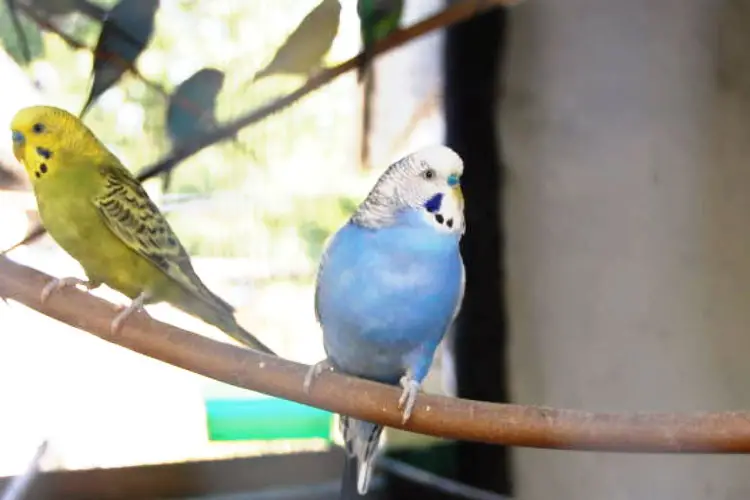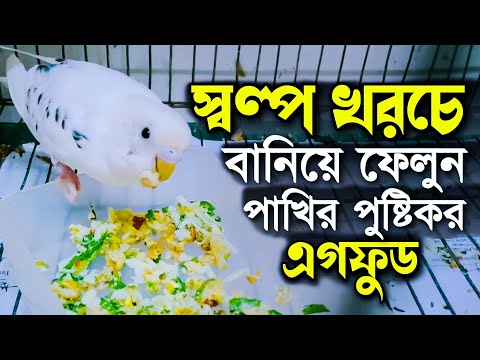Budgie egg food is rich in proteins—a key nutrient your budgie requires for proper growth and development. This nutrient ensures healthy growth of feathers, beaks, and muscles in your budgies. But before giving this food to your budgie, you need to know a few basics about it.
In this article, we will take you through everything you need to know about budgie egg food including what exactly it is, how it is beneficial for your pet budgies, how to prepare it, how much egg food to give your budgie, how often to give it, and so much more.
Budgie egg food: what is it?
Budgie egg food is exactly what it sounds like—budgie food whose primary ingredient is an egg. The egg is essentially hardboiled and then mashed into tiny bits that budgies can easily eat.
In addition, the recipe is also mixed with seeds, whole grains, fruits, and veggies. This makes it nutrition-packed and a good source of budgie’s essential nutrients for a strong healthy body.
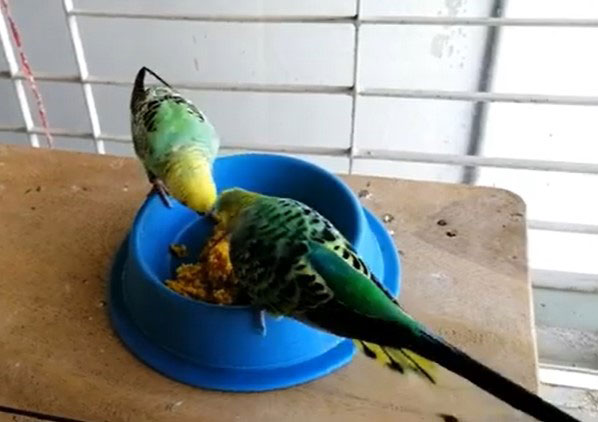
It’s worth noting that you can either get budgie egg food at pet stores (you’ll find egg food from multiple brands) or come up with your own at home.
What are the benefits of egg food?
Egg food provides your feathered friend with digestible proteins, calcium, and amino acids in their diet.
You can use it to supplement your bird’s diet and it can be especially helpful if your budgie is stressed, e.g. due to a change in environment.
It also makes a great molting supplement or during molting, nesting to help keep your budgie’s body strong.
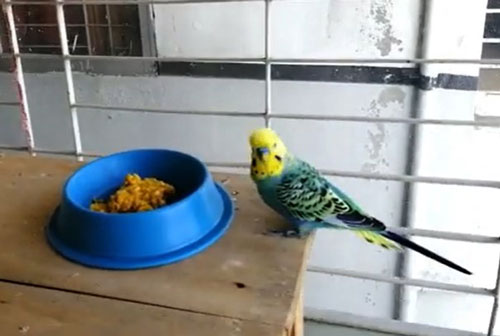
If your bird is under medication, using this food as a carrier of medication will ensure your birds take their medicine.
Once they become hooked to this food, you can easily add any food to it and your budgies will readily take it. This helps add a greater variety to your bird’s food.
How do you make budgie egg food?
Here’s an easy-to-follow recipe we found for making nutritious-packed egg food for your budgie:
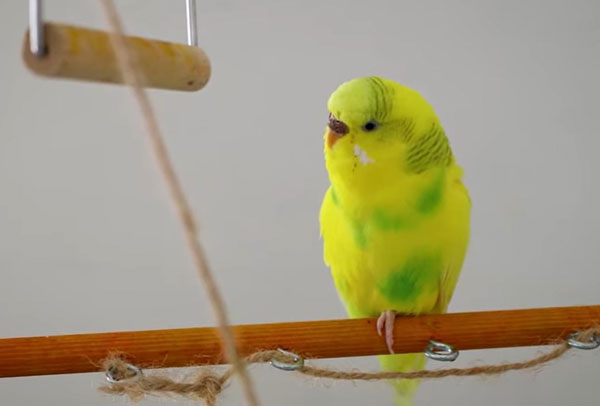
Ingredients:
- 1 egg, mashed
- 1tsp milled, mixed seeds or crushed budgie pellets
- 1tbsn brown rice, quinoa, or whole grain pasta,
- 1 tsp millet or flax seeds
- 2tbsp fresh fruit and veggies (diced and mixed)
- Any supplement you’d like to add
Directions:
Step 1. Hard boil the egg for around 10 to 15 minutes. Afterward, submerge it in a bowl of cold water to cool it down slightly and then peel off the shell. Mash the egg and then put it aside.
TIP: If you’re using organic or fresh farm egg, you can also dry ad shell and crush it together with the egg for an additional calcium supplement.
Step 2. Cook the brown rice or any other whole grain you have chosen. Make sure you thoroughly wash the rice or whole grains before cooking it to get rid of any impurities present.
This is of more importance when it comes to quinoa which contains saponin, a substance on its outside that makes it taste bitter and toxic for your birds.
Step 3. Once your rice is cooked, throw in millet or flax seeds to help soften them a bit. Put the food into a bowl and allow it to cool down.
Step 4. Ensure the fruits and veggies are nicely diced and mixed. Note that you should thoroughly wash the fruits and veggies and remove any seeds and skin if necessary before chipping them into small bits.
Step 5. At this point, you have everything ready and you just need to toss all the items together. You can also add any supplement of your choice at this point and serve your budgie.
Check this video on how to make a simple egg food for your budgies
Video:
Additional tips for budgie egg food preparation:
The amount of egg food to give your budgie depends on their size, age, etc. Generally, you should give your budgie as much food as you usually feed them.
As for the frequency, only give your budgies this once or twice a week and not daily!
Fruits aren’t necessary for this recipe but they help add a sweet kick to the food, making your budgie easily eat the food.
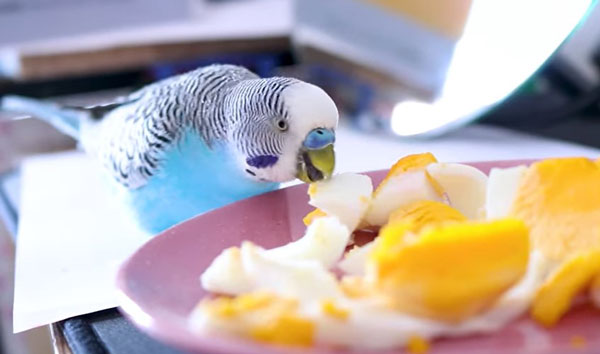
Avoid putting any honey or other sweeteners as it can make the food unhealthy for your budgie.
keep off recipes that suggest adding digestive biscuits to boiled egg foods. Biscuits made for human consumption are unhealthy for parakeets since they contain fat, salt, and sugar.
Make sure you remove all the leftover foods from your budgie’s cage after a few hours. This is important to help prevent bacteria and mold growth which can lead to various health issues.
Any remaining egg food can stay fresh for up to 3 days provided you store it in sealed paper.
How often should budgies eat egg food?
We advise you to give egg food to your budgies 1-2 times every week. Egg food should be treated as a treat for budgies.
As such, you shouldn’t give it to them every time, no matter how much they seem to enjoy it.
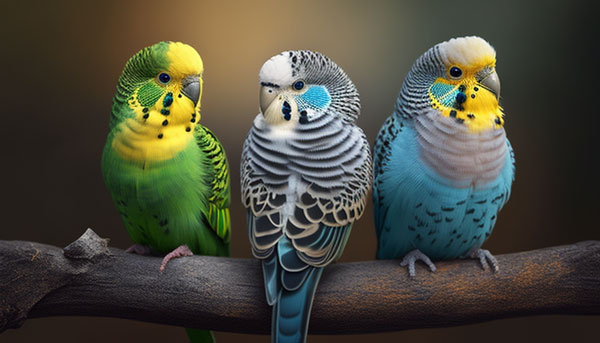
Given that this food gives your budgies a protein boost, it’d be especially helpful during molting, breeding, or times of stress in your budgies.
You don’t necessarily need to feed your budgie it every now and then, but it’s a healthy treat to consider for your budgie.
What to do if your budgie is not responding well to egg food
Monitoring your budgie closely to see how it responds to the new food you have just started giving it.
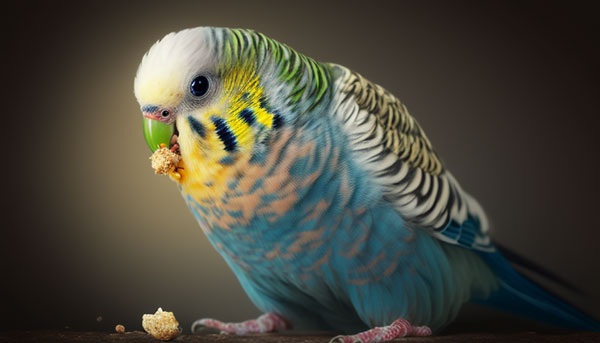
If he starts showing odd behavior such as loss of appetite, change in bowel appearance, etc., then it’s time to take him to an avian vet.
A vet will examine your budgie to find out if there are any underlying issues and then recommend the best action for you to take.
FAQs:
Egg food is good for budgies because it gives them a boost of proteins. The food is helpful when your budgie is molting, breeding, or when stressed.
Yes, budgies can eat scrambled eggs. They present a more exciting way to present eggs to your budgies with a new texture. However, you shouldn’t add any extra ingredients to these eggs such as pepper, salt, oil, etc. as they’re unhealthy for the budgie. Just make it plain scrambled eggs.
You can feed your budgie egg shells as they’re a great source of calcium. Just make sure you grind or crush them up and mix them with the rest of the budgie egg food before giving them to your budgie.
Final Verdict
Egg food is rich in proteins as well as other essential nutrients needed by your budgie’s body. After reading the above guide, you should now be able to prepare egg food for your budgie, know how much to feed your budgie, and how often.
Be sure to monitor your budgie after introducing this egg meal to it. If it doesn’t seem to respond well to it, seek veterinary help to prevent serious digestive issues in your budgie.
